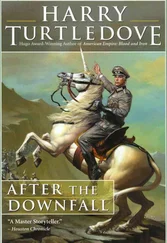“Why do you doubt it?” Monique bit off the words one by one.
“Why?” Pierre grinned at her and said no more.
“Enough teasing, Pierre.” Lucie could tell when Monique was on the ragged edge of cracking, where her own brother could not. Turning to Monique, she went on, “We have-which is to say, Marseille has-a good many friends in high places. From what we hear from them, the city is safe enough.”
“Friends where? Among the Germans?” Monique demanded. “They can’t keep any place in the whole blasted Reich safe.”
Her brother and his lover both burst out laughing. “Among the Germans?” he said. “No, not at all. By no means. I would not trust what a German told me if Christ came down from Heaven with a choir of angels to assure me it was so. But we have plenty of friends in high places among the Race, of that you may be very certain. They do not want to see such a fine place of business wiped off the face of the Earth-and so it will not be.”
Monique stared at him. “They will spare this city… for the sake of the ginger trade?” she said slowly. “I knew your connections with the Race were good. I never dreamt they were that good.” She wondered if Pierre was fooling himself.
But Lucie said, “Here we are, an obvious target close to Spain, a target close to Africa, but have they attacked us? No, not at all. Are they likely to attack us? I do not think so.”
“Well…” Monique hadn’t thought of it in those terms. Marseille was an obvious target. The Nazis knew it as well as the Lizards did; they wouldn’t have installed all those antiaircraft missiles in the hills outside the city if they hadn’t known it. But not even an enemy airplane had appeared over Marseille, let alone an enemy missile. Grudgingly, Monique said, “It could be, I suppose.”
“So far, it is,” Pierre said. “I see no reason to believe the future will be very much different from the past.”
That almost set Monique laughing, where nothing else had come close to doing the job. It was a very Roman attitude. It was, from everything she’d seen, also very much the attitude of the Race. But it wasn’t the attitude of the Reich, and it didn’t work so well for the Lizards here. That worried her.
Pierre wasn’t worried. After stubbing out the cigarette, he said, “Go on, Monique. Go shopping. Spend my money on whatever you want. After the Lizards finish the Nazis, they will still need people to buy and sell for them. We will be waiting. And if the Germans come back in another twenty years”-he shrugged-“they will need people to buy and sell for them, too. And we will still be waiting.”
That wasn’t a classical Roman attitude, but she had no doubt the inhabitants of ancient Massilia had shared it. And they would have had reason to do so. But not even Caesar’s sack of the ancient city would have wrecked it anywhere near so thoroughly as one explosive-metal bomb could. Monique wasn’t sure how well Pierre understood that.
She found another question to ask her brother: “How long can you hold out if the Lizards don’t come into Marseille to buy what you have to sell?”
He chuckled again. “Oh, twenty or thirty years, I would say. They make me extra money. I don’t deny that. But I do most of my business with people, anyhow. I can go right on doing that. Whether there is a war or not, plenty of things come into the Old Port. There aren’t enough Germans in the world to look through all the little boats that sail in from Spain and from Italy and from Greece and from Turkey.”
“Ah, Turkey,” Lucie said rapturously. “The business we do with Turkey, all by itself, could keep us afloat.”
“Poppies, I suppose,” Monique said, and her brother and his lover nodded. Monique had visions of opium dens and other sinister things. She didn’t know any details. She didn’t want to know any details. She shook her head. “Sordid.”
“It could be.” Pierre shrugged. “In fact, I suppose it is. You do not see Lucie or me using these things, do you? But there is a great deal of money to be had, from the Lizards and from the Nazis and from-” He broke off.
From the French, he’d been about to say. Monique knew it. Her brother wasn’t too proud to take his profits wherever he could find them. And she’d been living off his largesse ever since escaping Dieter Kuhn. She hadn’t thought till now about how filthy the bargain was. Maybe she hadn’t let herself think about it.
She took a deep breath, getting ready to tell him in great detail what she thought of him for doing what he did. Before she could speak, though, sirens all through Marseille started to scream. She sprang to her feet. “That is the attack warning!”
“It can’t be!” Pierre and Lucie said it together. But it was. The way they leaped up from their seats, the sudden horrid fear on their faces, said they knew it was, too.
Monique wasted no time arguing with them. “To the shelter, and pray God we aren’t too late.” With that, she was out the door and rushing down the stairs. Her brother and Lucie didn’t argue with her, either. They followed.
“How soon?” Lucie moaned. Even terrified, she sounded sexy. Monique wondered if that was worth admiring. But she also wondered, much more, about the question. If the Lizards had launched a missile from Spain, it would be in before she got to the basement of the block of flats, and that would be that. If it came from farther away, she had more time-but not much.
Down, down, down. The sirens kept screaming. Monique felt like screaming, too. Farther behind her, people with slower reactions were screaming, screaming with the dreadful fear that they might be too late, too late. She knew that fear. She clamped down on it till she tasted blood and realized she was also clamping down on the inside of her lower lip.
And there was the door to the cellar. “Merci, mon cher Dieu,” she gasped as she rushed inside: the most sincere prayer she’d sent up in many years. Oh, she’d wished Dieter Kuhn dead, but wishing that turned out to be far more pallid than wishing that she herself should stay alive.
Pierre and Lucie came in right behind her. Pierre started to slam the door, but a big, burly man almost trampled him. Monique grabbed her brother. Cursing, he said, “You’re going to kill us all.”
She had no good answer to that, not after her prayer of a moment before. The discovery that there were circumstances under which she would rather not stay alive was as astonishing as the discovery of how much she wanted to live.
More people crowded into the shelter. And then came a roar like the end of the world- just like the end of the world, Monique thought-and the lights went out. The ground shook, as if in an earthquake. It knocked Monique off her feet. She thought she was dead then.
Someone-maybe the burly man-did slam the door. After that, the darkness should have been complete, absolute, stygian. But it wasn’t, not quite. A light brighter than summer sunshine at its hottest showed all around the cracks between the door and its frame. Ever so slowly, it faded and reddened. Then it was black. Monique didn’t think the light itself had vanished quite so abruptly. She judged it much more likely that the block of flats had fallen down and cut off the view.
People-men and women both-were screaming about being buried alive. In the pitch blackness, Monique understood the fear, not least because she felt it herself. And then her brother flicked a flame from a cigarette lighter. “Ahh,” everyone in the shelter said together.
Pierre held up the lighter like a sacred talisman. “There will be candles,” he said in a voice of great certainty. “Hurry and find them.”
Читать дальше












